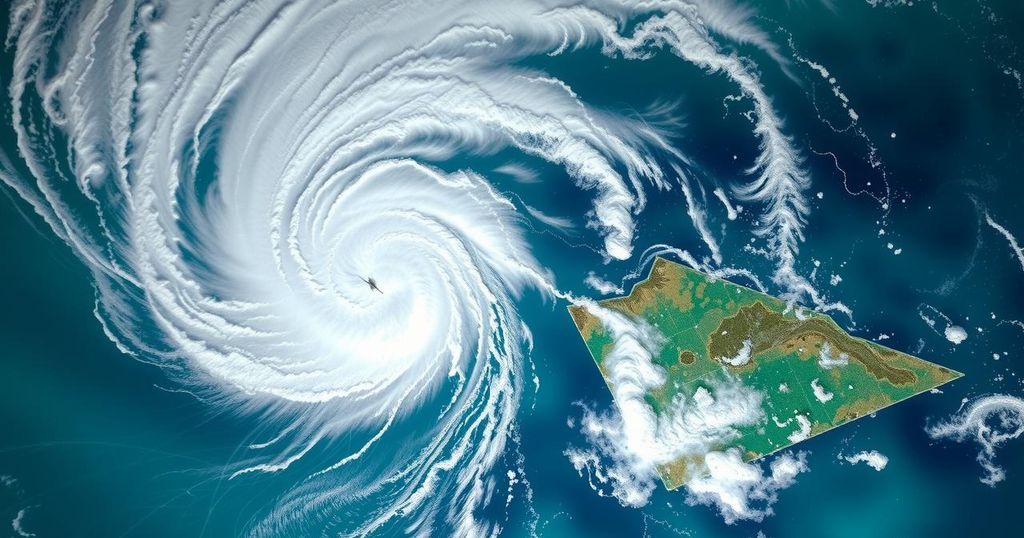Mayotte Strikes Again: New Tropical Storm Dikeledi Hits Just After Cyclone Chido’s Wrath
Mayotte is facing a new tropical storm, Dikeledi, shortly after Cyclone Chido caused widespread destruction and loss of life. Officials have issued a red alert due to risks of flooding and landslides, with emergency shelters being opened for residents. The ongoing recovery from Chido complicates the current crisis, highlighting the territory’s vulnerabilities and the need for comprehensive support from governmental authorities.
The French territory of Mayotte has been severely impacted by Tropical Storm Dikeledi, merely weeks after being devastated by Cyclone Chido, the most catastrophic cyclone in nearly a century. Authorities have mandated that residents remain indoors or seek solid shelter and prepare essential supplies as the storm brings heavy rainfall and fierce winds to the region. The disaster response is complicated by the ongoing recovery efforts from the previous cyclone, which resulted in significant loss of life and destruction.
After Cyclone Chido struck on December 14, killing at least 39 individuals and leaving over 200 missing, recovery efforts had just begun. Dikeledi had previously manifested as a cyclone over Madagascar before weakening to a tropical storm upon reaching Mayotte. The French meteorological service has indicated that Dikeledi could possibly regain strength as a cyclone. In anticipation, Mayotte’s authorities have issued a red alert due to heightened risks of flooding and landslides, prohibiting residents from venturing outside until the danger has subsided.
In light of these threats, cyclone shelters have been reopened, and emergency measures are being enacted to safeguard the population, particularly in vulnerable areas around the capital, Mamoudzou. The recent storm has led to reports of significant flooding, even in areas previously unharmed by Cyclone Chido. National response teams have been mobilized, involving over 4,000 personnel to assist those affected by the storms.
Mayotte, characterized by its dense population and numerous undocumented migrants, faces ongoing challenges with recovery efforts impeded by inadequate data on casualties and damage, especially regarding undocumented residents. The frequency and intensity of storms in the region, particularly during cyclone season, raise concerns for future safety and preparedness. Recent years have seen multiple devastating storms, contributing to the impoverished conditions of Mayotte, which is already the poorest territory in the European Union.
The cyclical nature of tropical storms in the southwestern Indian Ocean requires sustained attention for Mayotte as it continues to navigate recovery efforts and prepare for future natural disasters. The compounded effects of these storms necessitate urgent and comprehensive intervention from both local and international authorities to ensure the safety and welfare of the population.
Mayotte, an archipelago located in the Indian Ocean, has recently faced extreme weather events, including Cyclone Chido, deemed the worst cyclone in nearly a century, which wreaked havoc on the islands just last month. The territory, which is part of France and the poorest region in the European Union, houses approximately 320,000 residents along with an estimated 100,000 undocumented migrants drawn by French welfare benefits. Cyclone Dikeledi’s arrival marks another threat in a region already suffering from severe infrastructure damage and loss of life due to recent storms. The cyclone season in the southwestern Indian Ocean, encompassing the months from November to April, has increasingly seen strong and destructive storms. This trend has raised concerns about disaster preparedness and the socio-economic resilience of Mayotte and its people, who have experienced prolonged neglect and challenges from the French government in the aftermath of such disasters.
The dual impact of Cyclone Chido and Tropical Storm Dikeledi has underscored the vulnerability of Mayotte, particularly given its socioeconomic struggles and vulnerability to natural disasters. With the situation progressing, it is imperative for both local authorities and the French government to implement effective recovery plans and strategic interventions to mitigate future disaster risks. The ongoing challenges faced by Mayotte demand immediate and sustained attention to ensure the safety and support of its population, especially amid the frequent climatic threats in the region.
Original Source: www.wral.com




Post Comment